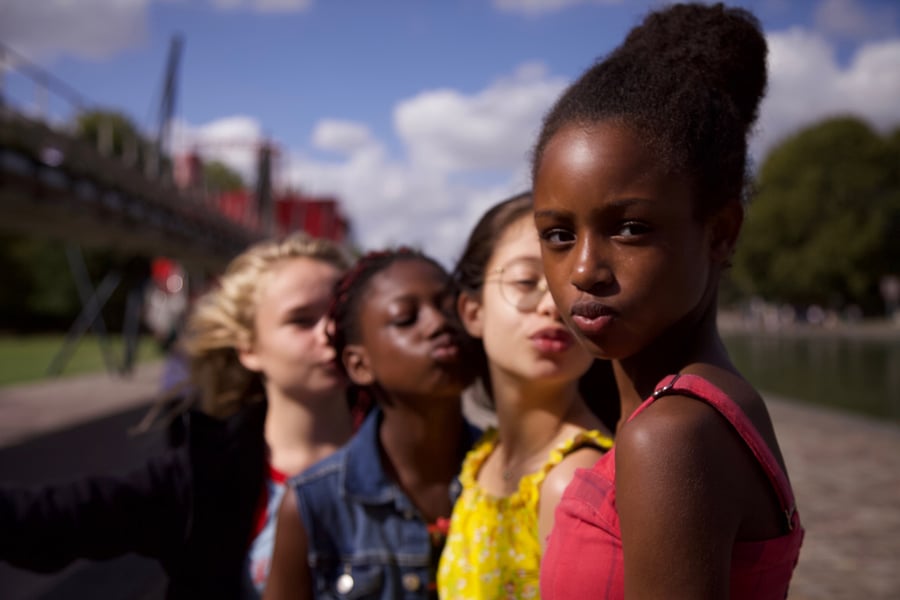Here’s what Cuties, the debut feature from French-Senegalese filmmaker Maïmouna Doucouré, is: the story of an 11-year-old named Amy (Fathia Youssouf) who’s stuck watching her family fall apart and is trying to find a place for herself in the world. Here’s what it is not: a salacious bit of pedo-bait designed to appeal to baser instincts rather than better angels. To be fair, Netflix — the company that purchased this slice-of-life drama at Sundance, where Doucouré won the Best Directing award in the fest’s World Cinema Dramatic Competition — did the work exactly zero favors by switching out the original French poster (kids romping down la rue after a shopping spree) for one featuring the underage cast in provocative poses and couture. Out of context, the girls’ outfits look questionably flashy and trashy; seen in context, as the costumes for a hip-hop dance troupe competing for a grand prize, you understand how they function in regards to a bigger-picture message that Doucouré is trying to get across.
None of which stopped people from claiming that the movie is softcore porn (it isn’t), and that Netflix’s marketing scheme was an absolutely boneheaded, wrong-footed, self-defeating move (guilty as charged). Petitions were circulated, right-wing pundits weighed in, Ted Sarandos issued a mea culpa and Doucouré received death threats. Suddenly, a sensitive coming-of-age movie became a culture-war target. And anyone who caught Cuties at a festival, or who bothers to stream it on Netflix starting today, can attest to the supreme irony here. It’s a portrait of girls that decries how sexuality is force-fed to them and/or viewed as the only way to foster self-esteem at far too young an age. It is the polar opposite of what it’s accused of being.
Your parental instincts may kick in when you see what the schoolyard cool kids that have caught Amy’s eye consider to be fashionable attire (seriously, you’re really wearing that top and those pants out?!). But the movie immediately establishes how this is part of the appeal to our heroine. Growing up in a highly observant Muslim household and watching her mother trying to hold it together after her father abandons the family, Amy feels confused, repressed and desperate to fit in. Adulthood is pain and humiliation. That quartet of hip-hop dancers, however — the collective known as “Cuties” who co-ordinate flash-mob freezes before class and are definitely trying way too hard to dress like they’re on runways or in music videos? They also represent freedom, popularity, empowerment. When Amy eventually befriends the multiculti crew’s leader Angelica (Médina El Aidi-Azouni), who happens to live in the same building as her, she gains entry into their inner circle. This is when the real growing pains start.
Doucouré is crafting a morality tale here, just not an obvious one — she prefers to observe her characters rather than outright judge them. And given that she has such a keen antenna for capturing how actual adolescents behave, the César-winning director turns Cuties into something closer at times to a nature documentary than a handwringing melodrama. Even the group’s outré routines, clearly age-inappropriate yet all too familiar to anyone who’s suffered through a tween dance recital, are uncomfortable but clearly aren’t run-of-the mill male-gaze lechery. Everything from peer pressure to post-makeover victory laps to the vamping for phone cameras, Instagram, viral videos etc. is seen through Amy’s wide eyes, which — thanks to Youssouf’s extraordinary, no-filter performance — fools us into thinking we’re watching someone hard-knock their way to maturity in real time. Amy thinks a second-hand pantomime of sexualized behavior is her pathway to womanhood. She will eventually learn it isn’t, though not before making some increasingly bad decisions and engaging in antisocial behavior. Regardless, the filmmaker looks at her sympathetically. Her innocence gets severely dinged, but never robbed entirely.
And innocence, in the movie’s eyes, is what needs to be protected at all costs. There are a handful of scenes that counteract some cringeworthy, car-wreck-in-progress bits of acting out with the simple pleasures of youth: a stuffed animal used as a between-floors greeting, a sugar rush fueled by a giddy candy binge, a slo-mo post-shopping skip down the street. When we do eventually arrive at the sequence involving the kids in those grotesque outfits that attracted criticism, the scene is played for anything but sleaze. It’s merely the set up for lifting the veil from Amy’s eyes, and for Doucouré final coup de grace. She’s gone on record as saying Cuties is about how so many young woman are robbed of their youth early, and that the formative experiences of childhood need to be preserved. How she grants her character this sense of grace one last time, in a shot that slowly dips into magical realism, must be seen to be believed. It is anything but tragic. The fact that so few will be willing to see Cuties all because of a major, misleading marketing mistake — that’s the tragedy.
From Rolling Stone US
Love Music?
Get your daily dose of everything happening in Australian/New Zealand music and globally.



































